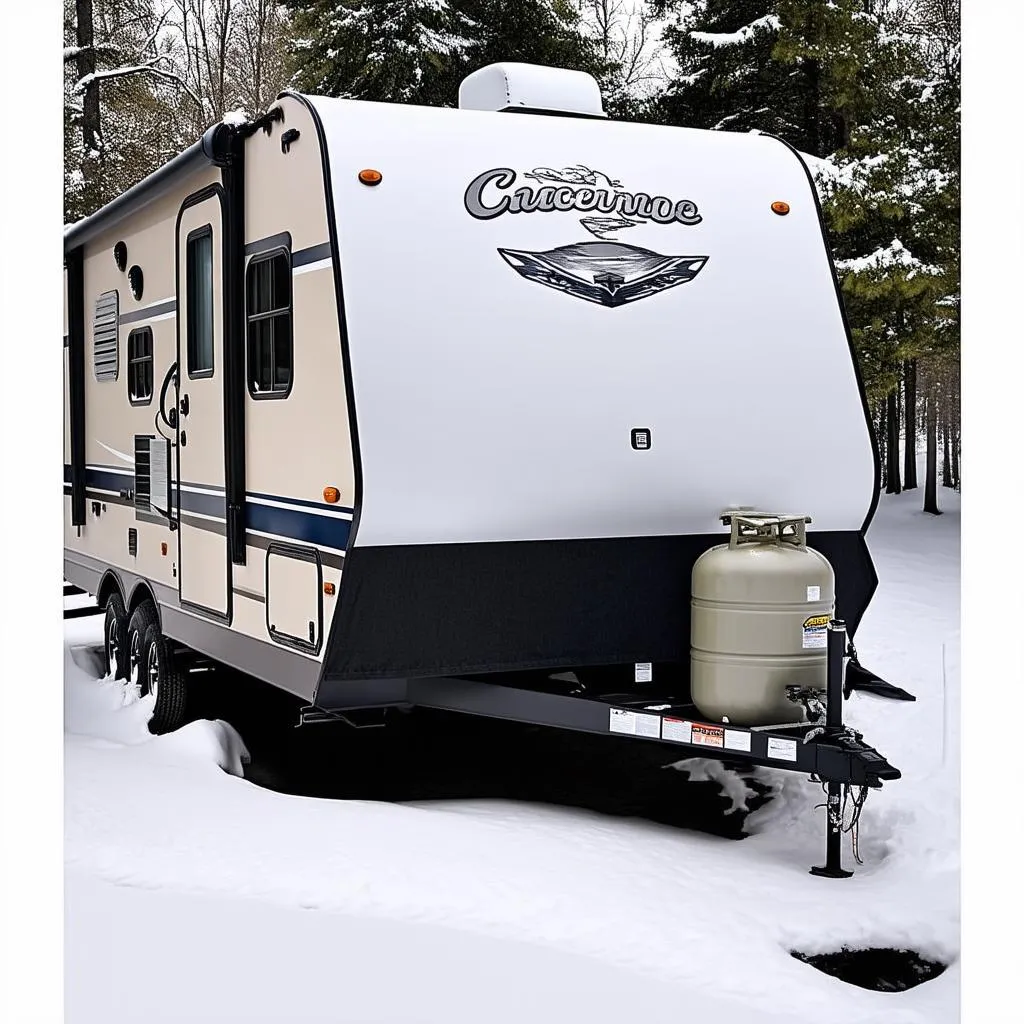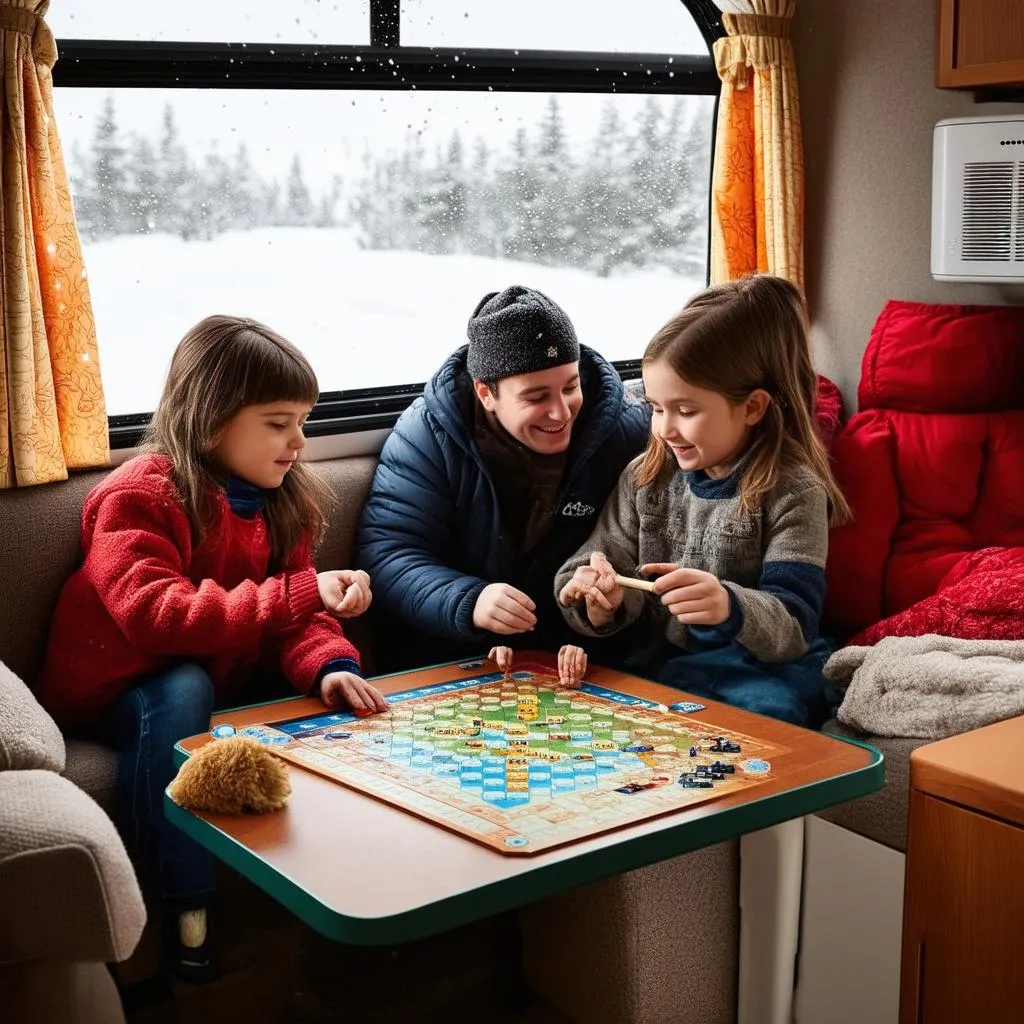Remember your last winter camping trip? The crisp air, the snow-dusted pines, the cozy nights tucked inside your travel trailer… But then you think about the frozen pipes, the chilly drafts, and the hassle of de-winterizing come spring.
Living in your travel trailer year-round, even during the colder months, is entirely possible with the right preparation. This guide will walk you through everything you need to know to winterize your travel trailer for full-time living, so you can enjoy the beauty of every season.
Understanding the Importance of Winterization
Before we dive into the how-to, let’s understand why winterizing your travel trailer is crucial for full-time living.
Imagine waking up in your cozy trailer parked near the Grand Canyon, only to find your water system unusable because the pipes froze and burst overnight. Not only is this a major inconvenience, but it also means costly repairs and a disrupted travel plan.
Proper winterization safeguards your investment by:
- Preventing frozen pipes: Water expands when it freezes, and if it’s inside your pipes, it can cause them to crack and burst.
- Protecting your plumbing system: Beyond pipes, your water heater, pump, and other components need protection from freezing temperatures.
- Preventing mold and mildew: Moisture buildup in a closed-up trailer during winter can lead to mold and mildew growth, creating health hazards and unpleasant odors.
How to Winterize Your Travel Trailer: A Step-by-Step Guide
Follow these steps to ensure your travel trailer is ready to brave the winter chill:
1. Prepare Your Trailer
- Thorough cleaning: Give your trailer a deep clean inside and out. Remove all food items, personal belongings, and linens. A clean trailer is less likely to attract pests and will help you spot any potential issues.
- Inspect for leaks: Check for any cracks or gaps around windows, doors, vents, and seams. Seal them using weatherstripping, sealant, or expanding foam.
- Remove valuables: If you have any sensitive electronics, important documents, or other valuables, it’s best to store them elsewhere during the winter.
2. Winterize Your Water System
- Drain the freshwater tank: Completely empty your freshwater tank, including the water heater.
- Bypass the water heater: Most water heaters have a bypass valve. Engage it to prevent antifreeze from entering the tank.
- Add antifreeze: Use RV-specific, non-toxic antifreeze. Following the manufacturer’s instructions, pump it through your entire water system – faucets, shower, toilet, and any exterior connections.
- Don’t forget the drains: Pour a small amount of antifreeze down each drain, including the shower and sinks.
3. Insulate and Protect
- Window insulation: Window film kits are a cost-effective way to add an extra layer of insulation to your windows.
- Pipe insulation: Use foam pipe insulation to protect exposed pipes, especially those underneath the trailer.
- Skirting: Consider installing a skirt around the base of your trailer to block wind and trap heat. This is especially important if you’re parked in an area with significant snowfall.
- Cover vents: Use vent covers to prevent drafts and snow from entering through roof vents. However, ensure you have at least one vent partially open for ventilation.
4. Other Essential Tasks
- Check batteries: Remove your batteries and store them in a cool, dry place. If you have lead-acid batteries, keep them charged throughout the winter.
- Propane safety: Turn off your propane tanks and disconnect them. Store them outdoors in a well-ventilated area.
- Cover tires: Protect your tires from UV damage and cracking by covering them.
- Elevate your trailer: If possible, elevate your trailer slightly to prevent it from sitting directly on frozen ground.
 Winterized Travel Trailer
Winterized Travel Trailer
Tips for Living in a Winterized Travel Trailer
- Invest in a space heater: A small, energy-efficient space heater can make a huge difference in keeping your trailer warm.
- Layer up: Dress warmly in layers, even inside the trailer.
- Cook outside: If possible, cook outside using a camping stove or grill. This will help conserve heat and prevent moisture buildup inside the trailer.
- Ventilation is key: Even though it’s cold, it’s important to ventilate your trailer regularly to prevent condensation and mold growth.
FAQs about Winterizing a Travel Trailer for Living In
Q: Can I use regular automotive antifreeze?
A: No! Never use automotive antifreeze in your RV water system. It’s highly toxic and can be fatal if ingested. Always use RV-specific, non-toxic antifreeze.
Q: How often should I run my water system during winter?
A: It’s a good practice to run your water system for a few minutes every couple of weeks to keep the seals lubricated and prevent them from drying out.
Q: What temperature should I keep my trailer at?
A: Aim to keep your trailer above freezing (32°F or 0°C) to prevent pipes from freezing.
Travelcar.edu.vn: Your Resource for All Things Travel Trailer
Planning a winter road trip through the scenic Route 66? Looking for more tips on maintaining your travel trailer? Visit travelcar.edu.vn for expert advice, travel inspiration, and resources to make your journey comfortable and unforgettable.
 Family Inside Winterized Travel Trailer
Family Inside Winterized Travel Trailer
Conclusion: Embrace Winter Adventures in Your Cozy Home on Wheels
Winterizing your travel trailer for full-time living might seem daunting, but with careful preparation and these tips, you can enjoy the freedom of the open road year-round. Remember, thoroughness is key. Don’t cut corners when it comes to protecting your investment and ensuring a comfortable winter experience. So pack your warmest blankets, brew some hot cocoa, and get ready to create lasting memories amidst the snowy landscapes.